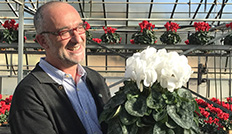 Professional area | Culture factsheet | Nutrient solution | Biological quality of the nutrient solution
Professional area | Culture factsheet | Nutrient solution | Biological quality of the nutrient solution
The origin of the water used, and its biological quality, can present certain dangers of infection.
Water should be tested for micro-organisms before use.
Like the growing medium, the nutrient solution can readily harbour disease. At the start of the growing cycle the root microflora are not well enough developed to compete if need be with pathogenic organisms. The biological characteristics of the growing medium can be controlled, as can the various pests and disease vectors (e.g. insects) by preventive practices and chemical controls; which leaves the water used for watering and for making up nutrient solutions as the main potential source of contamination.
Water quality is therefore one factor that must be checked and controlled; and to do this certain reliable indicators must be established which can be checked throughout the growing cycle. The biological quality of the water depends on where it comes from: drinking water mains, well water, rainwater, reservoir or river water. These last three sources of supply generally provide poor quality water, though rainwater can be slightly better than the others, depending on how it is stored.
The nutrient solution itself should be assayed biologically so as to determine how contamination levels are changing over time, especially when it is recycled. In practice, microscopic organisms can be detected once they are present in sufficient quantities for the means used, each of which has its detection threshold. Moreover, there are micro-organisms which cannot be cultured.
Current means of detection are incresasingly based on the use of specific antibodies aimed at particular organisms (the ELISA method) or PCR amplification of DNA.
These techniques allow an overall count of micro-organisms without allowing for the fact that some are harmless, and that not all strains are equally virulent. It is not easy therefore to make an assessment of the real dangers of disease involved in the use of nutrient solutions.
There are various physical, chemical and biological resources we can deploy in order to reduce the risks.
Mixing plant protection products into the nutrient solution is a widespread practice among growers.
This only applies to some of the nutrient solution and is never total. A system could be devised for putting in control organisms.
We should point out also that the temperature of the nutrient solution itself has an effect on the multiplication and survival of the disease organisms (Lemanceau et. al., 1995). Work since 1995 has also demonstrated that a low oxygen content in the nutrient solution encourages certain strains of Pythium which then become more virulent.
LEMANCEAU P., LETARD M., STEINBERG C.- Qualité biologique de la solution nutritive. P.H.M. Revue Horticole, n°363, Octobre 1995, p. 24-29
2565, rue de Montourey
83600 Fréjus - France
International telephone : +33 (0)4 94 19 73 04
Switchboard : + 33 (0)4 94 19 73 00
Fax : +33 (0)4 94 19 73 19

